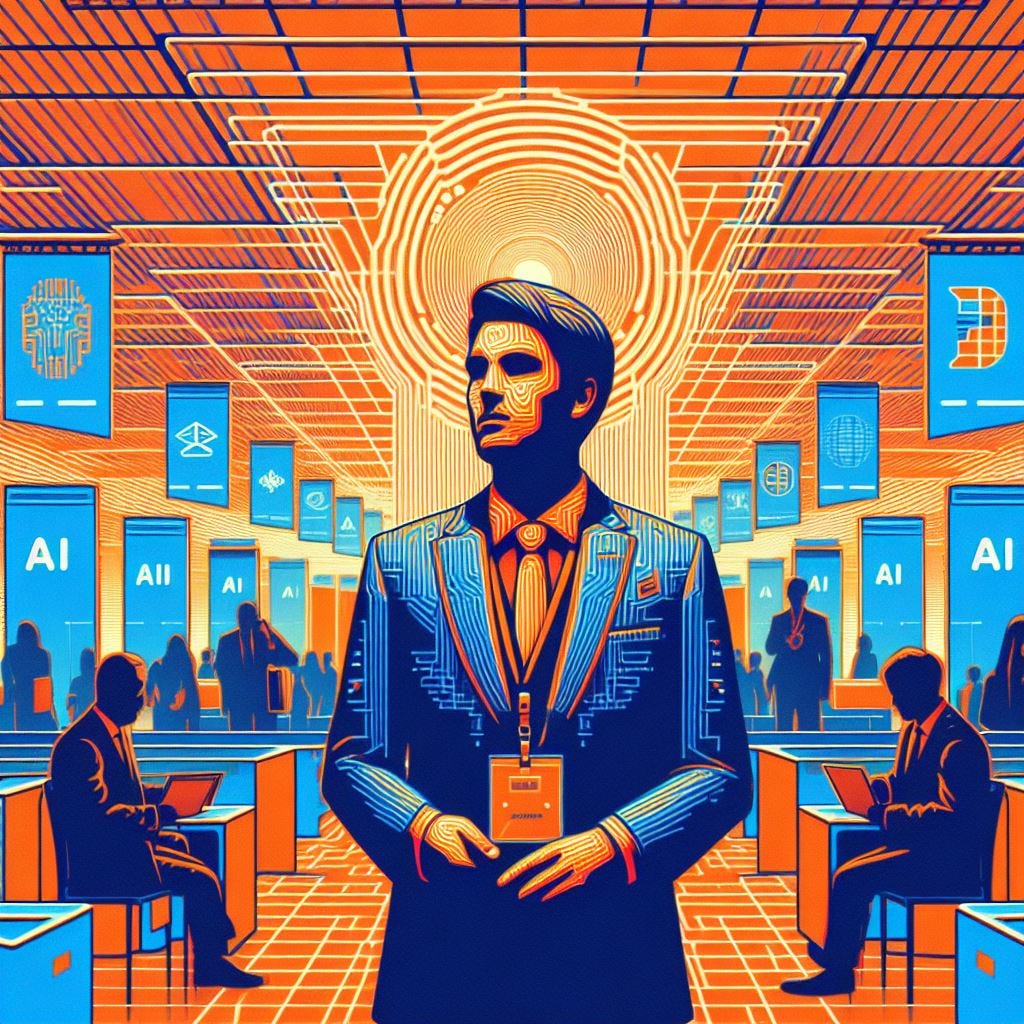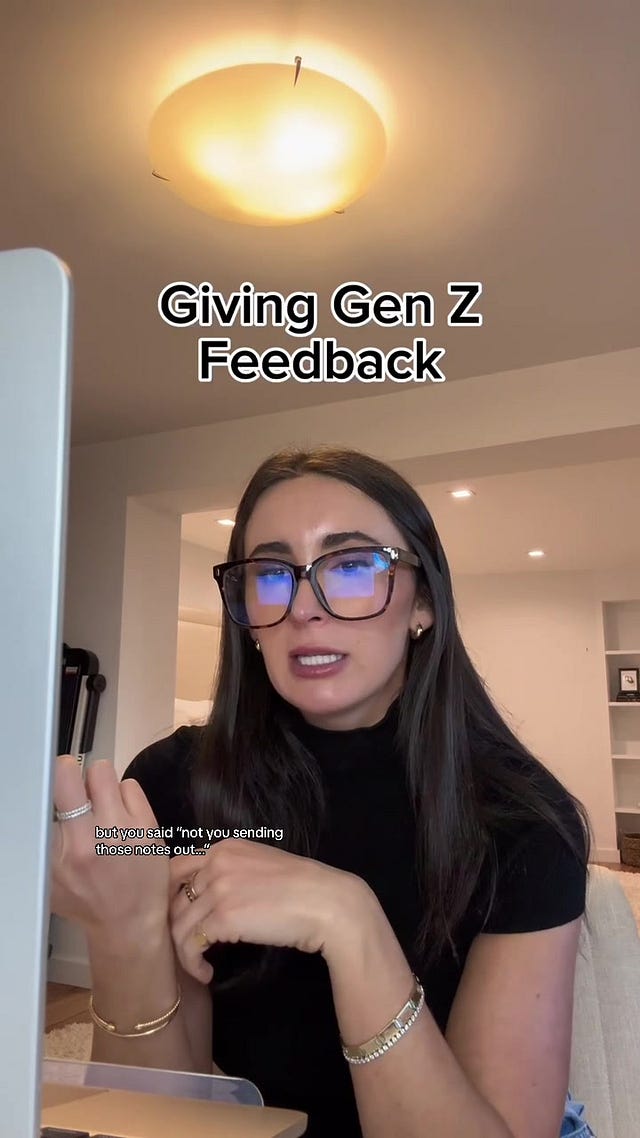After ten years in L&D, I finally attended Learning Tech...
What one of L&D's biggest conferences tells us about our profession.
While I’ve now worked in L&D for almost a decade, I’d never been to Learning Technologies until last week.
Accompanied by some of my colleagues from Mind Tools, I spent most of my time at the conference meeting with clients, catching up with friends, and trying not to give off ‘buyer’ vibes in the exhibition hall.
On Thursday, I delivered a session with Becky Eason about a leadership-development program we created with South Western Railway, and how we measured its impact.
If you joined us in the glamorous environs of Theatre 10, thank you for chuckling along at my terrible puns. If you missed the session, fear not! I’ll return to this topic in a future edition of the Dispatch.
Today, though, I want to share a few reflections on my first visit to Learning Tech, along with some thoughts on L&D conferences in general.
🫠 AI excitement meets AI fatigue.
Unsurprisingly, AI was everywhere at Learning Technologies. Like, everywhere. Products that have existed for years are now ‘powered by AI’ or augmented by ‘AI tools’.
Although my session with SWR had nothing to do with artificial intelligence, I still opened our presentation with a joke about AI. So even if you’re not talking about it, you still somehow end up talking about it.
A few years ago, Larry David starred in a Superbowl ad for the now-bankrupt crypto exchange FTX, in which David played the archetypal techno-skeptic. While the ad was entertaining, its underlying message wasn’t ‘this technology will solve problems for you’. Instead, it was ‘this is the next big thing, so get in now before you miss out!’.
To be clear, I’m not equating AI with crypto, nor am I suggesting that even the most cynical applications of AI in L&D are comparable to the level of deception perpetrated by FTX. What I am saying is that the hype around AI – and the commercial incentives to shoehorn it into every new learning product – creates a lot of noise for potential L&D buyers. In this environment, how do you distinguish the transformative from the merely tokenistic? (Crypto pun intended.)
Nearly everyone I spoke to at Learning Tech expressed a mixture of excitement and fatigue about AI. So, I’m curious, reader. Where would you place yourself on the following, unscientific scale?
To end the compulsory AI section of this newsletter on a more positive note, Donald Taylor (Mr Learning Technologies himself) and Egle Vinauskaite’s latest report explores how learning practitioners are not just talking about AI, but putting it to work in their organizations. (You can find more on the report in this week’s ‘Deep dive’.)
🕺 A conference is a moveable feast.
The great thing about Learning Technologies, and other large conferences, is that it allows you to choose your own adventure.
If you’re a learning measurement nerd, you can build a schedule around that topic. If you think measurement is boring and want to test out some cool new tech, you can do that too. If you’re tired of hearing about AI, then… well, there’s probably not much you can do to avoid it. But you can darn well try!
One of the things that stood out to me over the two days of the conference was the different expectations people brought to the event. For folks who had recently joined the industry — like my colleague Fiona Inglis, our team’s newest Learning Experience Designer — it was an opportunity to hear from some of the leading thinkers in L&D. For those who were attending Learning Tech for the umpteenth time, it was primarily a chance to catch up with old friends.
The challenge of delivering any ‘learning event’ – like a conference - at scale is that people start from different points, bringing different perspectives and experiences to the table. But this can also be a strength, provided you give people the flexibility to adapt the experience to their needs.
🩺 Learning practitioner, teach thyself?
On the train home from Learning Technologies, while trawling through post-LT reactions on LinkedIn, I was struck by this characteristically provocative post from Nick Shackleton-Jones:
“Reading through everyone's #LT24UK posts, it's clear the reason we like to be at a learning event is meeting friends, making friends, chatting with peers, feeling like we belong, wandering around - maybe having a go at something... or spotting some things we can look up later.
Strange then, that we imagine our learners want something different from learning events - or that what they get from events can be replaced with technology.”
This resonated with me because, throughout the event, I’d found myself thinking about the extent to which our own learning preferences are reflected in the experiences we design for others.
As Ross G wrote last year, the lecture remains the default format for sessions at every big L&D conference… even though we know it’s not that effective.
Are we just not very good at taking our own medicine? Or, as Nick suggests, do we need to take another look at the prescription?
Interested in working with the Mind Tools Custom Team? Want to share your thoughts on this week’s Dispatch? Then get in touch by emailing custom@mindtools.com or reply to this newsletter from your inbox.
🎧 On the podcast
A highlight of Learning Technologies was getting to meet people I felt like I knew, but had never met in person. One of these people was Lauren Waldman, AKA Learning Pirate.
In last week’s episode of The Mind Tools L&D Podcast, Ross G and I sat down with Lauren to discuss her journey into neuroscience, and how much learning designers need to know about the brain to be effective in their roles.
Check out the episode below. 👇
You can subscribe to the podcast on iTunes, Spotify or the podcast page of our website. Want to share your thoughts? Get in touch @RossDickieMT, @RossGarnerMT or #MindToolsPodcast
📖 Deep dive
As I mentioned above, Donald Taylor and Egle Vinauskaite’s latest report explores how learning professionals are translating AI talk into action.
While many practitioners are using artificial intelligence for content creation and basic learning-design tasks, it is encouraging to see that some L&D teams are applying the technology to more sophisticated use cases — notably coaching, personalization, and knowledge management.
As the authors note, moving beyond mere efficiency gains requires L&D teams to step outside their department and engage with colleagues across the business:
“There is nothing new here. To use AI well, L&D needs to do the boring stuff well: have the uncomfortable conversations, build the relationships, set the expectations, and be doggedly persistent against indifference and inertia.”
In this way, meaningful application of AI is no different than it is for any other technology.
Taylor, D & Vinauskaite, E. (2024). ‘AI in L&D: From talk to action’
👹 Missing links
⛓️💥 Things we can’t out-train
As we know, training isn’t the answer to every problem. In this excellent newsletter (the first in a new series) Jess Almlie explores one of the issues training can’t solve — inefficient processes. Training people on an inefficient process might make them more familiar with it, but this won’t address the root cause of the problem. When the team that owns the process comes to L&D’s door to ask for training, we need to be prepared to explore alternative solutions rather than rushing to fulfil the order.
📷 Winners of the 2024 World Press Photo Contest
Every year, I try to catch the World Press Photo exhibition when the images go on display at the Scottish Parliament in Edinburgh. The winners of the 2024 contest have just been announced, and they can be viewed through this interactive on the World Press Photo website.
🎙️ What was it like to work at Guantánamo in the early 2000s?
Remember Serial, the podcast that launched a thousand true-crime specials? After a long hiatus, Sarah Koenig is back with a new season, looking into the history of Guantánamo Bay. I listened to the first episode on the way back from Learning Tech (I guess I needed some light relief.), and was hooked as soon as I heard the familiar Serial soundtrack.
👋 And finally…
While I was down in London this week, my wife joined TikTok. She has been sending me videos like this ever since:
 Tiktok failed to load.
Tiktok failed to load.Enable 3rd party cookies or use another browser
👍 Thanks!
Thanks for reading The L&D Dispatch from Mind Tools! If you’d like to speak to us, work with us, or make a suggestion, you can email custom@mindtools.com.
Or just hit reply to this email!
Hey here’s a thing! If you’ve reached all the way to the end of this newsletter, then you must really love it!
Why not share that love by hitting the button below, or just forward it to a friend?



